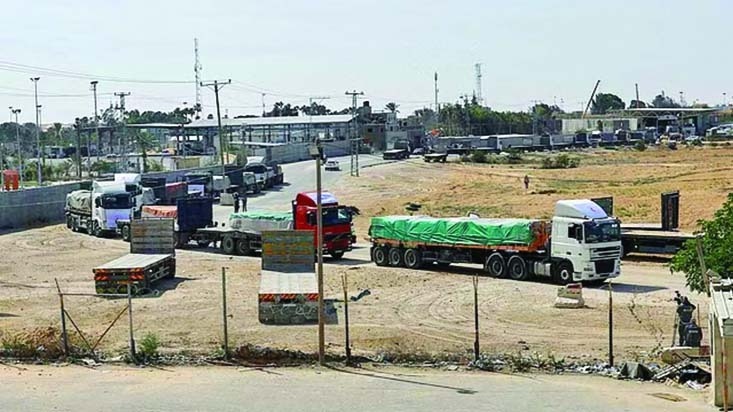Gaza needs billions in aid to reverse years of restrictions: UN

Gaza needs billions of dollars in international economic aid to compensate for years of restrictions that have stifled its economy and curbed its development, according to a report published on Wednesday by the United Nations trade body.
In its report on the economic development of the Occupied Palestinian Territory for 2022, the United Nations Conference on Trade and Development (UNCTAD) highlighted the dire economic conditions in Gaza, even prior to Israeli strikes on the enclave in reprisal for the deadly Oct 7 attacks by Hamas gunmen in southern Israel, Reuters reports.
"Donors and the international community need to extend significant economic aid to repair the extensive damage Gaza has experienced under prolonged restrictions and closures and frequent military operations, which has stifled the economy and decimated infrastructure," the report said.
"While donor aid is important to assist the people of Gaza, it should not be viewed as a substitute for ending the restrictions and closures and calling on Israel and all parties toRead More : Cairo peace summit grapples with Gaza war bear their responsibilities under international law." Speaking to reporters in Geneva, Richard Kozul-Wright, director of UNCTAD's division on globalisation and development strategies, said it was difficult to fully assess how much money would be needed to buttress the economy in Gaza, which is controlled by the Hamas militant group.
"It's very difficult to make a proper assessment until things stop," he said, referring to the current conflict. "But it's going to be in the billions of dollars."
Last year Palestinian authorities received only $250 million in donor budget support and $300 million for development projects, the report said.
There has also been a steep decline in foreign aid between 2008 and 2022, from $2 billion - representing 27% of gross domestic product (GDP) - to $550 million, or less than 3% of GDP, last year.
Nearly half of Gaza's population is unemployed and more than half lives in poverty, the report said. Although workers in Gaza have been allowed access to Israel's job market for the first time in recent years, the number of permits issued -- around 1% of employed workers in Gaza -- are too few to counter poverty.
"Border closures and repeated military operations have set in motion a vicious circle of economic and institutional collapse...," it said. "The impact is not confined to the short term. Indirect and long-term effects will reverberate through future generations."
In its report on the economic development of the Occupied Palestinian Territory for 2022, the United Nations Conference on Trade and Development (UNCTAD) highlighted the dire economic conditions in Gaza, even prior to Israeli strikes on the enclave in reprisal for the deadly Oct 7 attacks by Hamas gunmen in southern Israel, Reuters reports.
"Donors and the international community need to extend significant economic aid to repair the extensive damage Gaza has experienced under prolonged restrictions and closures and frequent military operations, which has stifled the economy and decimated infrastructure," the report said.
"While donor aid is important to assist the people of Gaza, it should not be viewed as a substitute for ending the restrictions and closures and calling on Israel and all parties to
"It's very difficult to make a proper assessment until things stop," he said, referring to the current conflict. "But it's going to be in the billions of dollars."
Last year Palestinian authorities received only $250 million in donor budget support and $300 million for development projects, the report said.
There has also been a steep decline in foreign aid between 2008 and 2022, from $2 billion - representing 27% of gross domestic product (GDP) - to $550 million, or less than 3% of GDP, last year.
Nearly half of Gaza's population is unemployed and more than half lives in poverty, the report said. Although workers in Gaza have been allowed access to Israel's job market for the first time in recent years, the number of permits issued -- around 1% of employed workers in Gaza -- are too few to counter poverty.
"Border closures and repeated military operations have set in motion a vicious circle of economic and institutional collapse...," it said. "The impact is not confined to the short term. Indirect and long-term effects will reverberate through future generations."
Source: dailyasianage.com
